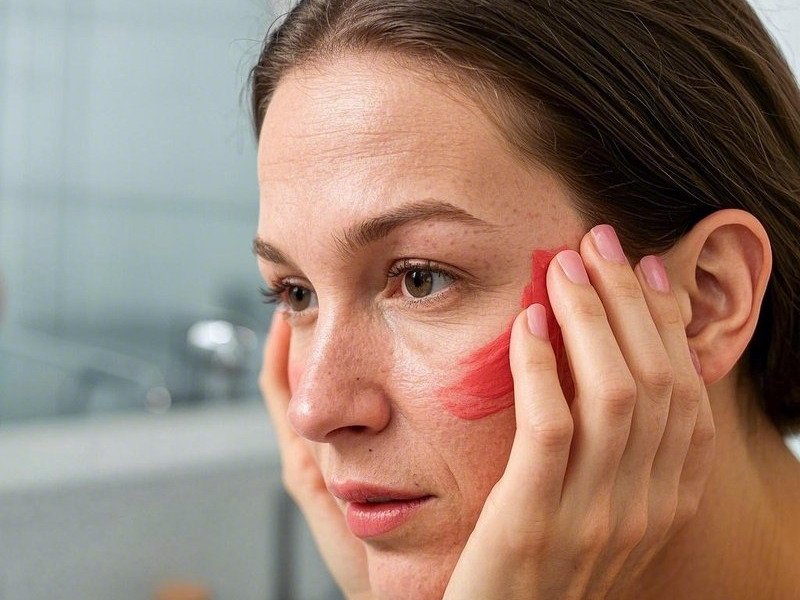Skin sensitivity is something many of us struggle with daily, yet it often goes unspoken. Whether it’s a reaction to a harsh skincare product or simply a persistent irritation in certain environmental conditions, understanding the underlying causes of skin sensitivity can help individuals better manage and care for their skin. But what causes our skin to become sensitive in the first place? And more importantly, how can we reduce these reactions for smoother, healthier skin?
Skin sensitivity arises from several factors such as environmental changes, diet, genetics, and even skincare products. Identifying the root cause can help you avoid triggers and reduce irritation, allowing your skin to thrive.
As you explore this article, you’ll gain a deeper understanding of why your skin might be reacting the way it is, and how lifestyle changes, better skincare routines, and professional advice can bring significant relief. Let’s dive deeper into the world of skin sensitivity.
What Are the Common Causes of Skin Sensitivity?
Skin sensitivity can develop due to various factors, many of which are linked to daily habits, environmental exposure, and even underlying medical conditions. Understanding these common causes is essential in managing skin irritation.
Common causes of skin sensitivity include environmental factors like temperature changes, allergens, and certain skincare products. Lifestyle and genetics also play a role in how your skin reacts to external stimuli.
Environmental Stressors:
When we think about environmental causes of skin sensitivity, it’s hard to ignore the role of harsh weather conditions. Cold air, hot sun, and pollution can strip the skin of moisture and cause it to become more sensitive. Similarly, allergens such as pollen, dust, or pet dander may trigger inflammatory responses in some individuals, leading to flare-ups of conditions like eczema or rosacea.
| Environmental Stressor | Effect on Skin |
|---|---|
| Cold air | Can dry out the skin and lead to irritation. |
| Hot sun | UV radiation damages the skin and causes inflammation. |
| Pollution | Fine particles in the air irritate the skin and cause premature aging. |
| Allergens (pollen, dust) | Can trigger allergic reactions, leading to redness and inflammation. |
Allergens and Irritants:
For many, allergens are the leading cause of irritation. Skin reacts to substances it considers harmful—whether it’s a food item, a fragrance in skincare, or even a laundry detergent. In fact, up to 60% of individuals with sensitive skin report fragrance or preservatives as common irritants in skincare products.
Lifestyle Factors:
Your lifestyle habits matter too. For instance, excessive sun exposure without protection can lead to skin sensitivity. On the flip side, poor hydration and a lack of sleep weaken the skin’s barrier, making it more prone to irritants.
How Does Diet Affect Skin Sensitivity?

Diet plays a pivotal role in the health of your skin. The foods you eat not only nourish your body but also affect your skin’s resilience to irritation.
Certain foods, like spicy dishes, alcohol, or dairy, may exacerbate skin sensitivity, while maintaining a healthy, well-balanced diet can help reduce skin inflammation.
Trigger Foods:
Common foods that trigger skin sensitivity include spicy foods, dairy, and high-sugar items. These can lead to an increase in inflammation, which in turn can cause flare-ups of sensitive skin conditions such as acne or eczema.
| Trigger Food | Effect on Skin |
|---|---|
| Spicy foods | Can increase blood flow to the skin, leading to redness and irritation. |
| Dairy | Contains casein, which may trigger inflammation and acne in some individuals. |
| Sugary foods | Excess sugar promotes the production of advanced glycation end products (AGEs), which accelerate skin aging and irritation. |
Hydration Matters:
A well-hydrated body equals better skin. Dehydration is a major factor that can cause dry, flaky skin, making it more susceptible to irritation. Consuming water-rich foods like cucumbers, watermelon, and leafy greens can also improve skin hydration.
Nutrients for Skin Health:
On the positive side, foods rich in antioxidants, such as berries, leafy vegetables, and fatty fish like salmon, can actually help reduce inflammation and improve skin health over time. Including vitamins like C and E in your diet can also boost your skin’s ability to repair itself.
Are Genetics a Factor in Skin Sensitivity?
Yes, genetics plays a significant role in how sensitive your skin can be. It’s not just about your environment or lifestyle; your DNA has a huge influence on your skin’s natural defense mechanisms, including how it reacts to irritants, environmental factors, and even the products you apply. In fact, certain genetic traits can make your skin more prone to irritation, dryness, or conditions like eczema and rosacea.
Genetics are a key factor in determining your skin’s sensitivity. If your family has a history of skin conditions like eczema, rosacea, or psoriasis, you may be more likely to develop sensitive skin. Additionally, your skin type—whether it’s fair or dark—can also influence how prone your skin is to sensitivity.
1. Inherited Skin Conditions and Sensitivity
Certain inherited skin conditions can make your skin more sensitive to the environment. For example, eczema (atopic dermatitis), psoriasis, and rosacea are all genetic conditions that can result in heightened skin sensitivity. If you have a family history of these conditions, your skin might be more prone to reactions such as redness, irritation, and inflammation.
- Eczema: This condition is often inherited and affects the skin’s ability to retain moisture. Individuals with eczema have a weakened skin barrier, making them more susceptible to irritants, allergens, and even changes in temperature.
- Psoriasis: Psoriasis is another genetic skin condition that causes skin cells to multiply rapidly, leading to scaling, redness, and irritation. This accelerated skin turnover can cause increased sensitivity to certain products or environmental conditions.
- Rosacea: This condition often runs in families and involves redness, visible blood vessels, and sometimes acne-like bumps. People with rosacea have a heightened sensitivity to triggers like spicy food, alcohol, heat, or stress.
Genetics influences the way your immune system responds to these triggers. People with a family history of these conditions may have a more reactive immune response, leading to inflammation and irritation of the skin.
2. Skin Types and Sensitivity
Your skin type is another genetic factor that influences sensitivity. Fair-skinned individuals tend to have more sensitive skin compared to those with darker skin tones. This is because fair skin has less melanin, the pigment that provides some level of natural UV protection. As a result, those with lighter skin may experience greater sensitivity to sun exposure, leading to burning, redness, and irritation.
| Skin Type | Sensitivity to Environmental Factors |
|---|---|
| Fair Skin | More prone to sunburn, UV damage, and irritation due to lower melanin levels. |
| Medium Skin | Less sensitive to UV rays but still susceptible to environmental irritants like pollution. |
| Darker Skin | Generally less prone to sunburn but can experience irritation from harsh products and certain allergens. |
However, darker skin isn’t immune to sensitivity. People with darker skin tones may have a more robust defense against UV rays but can still be affected by pollutants, skincare products, or lifestyle habits.
3. Skin’s Barrier Function
One of the main ways genetics impacts skin sensitivity is through the skin’s barrier function. The outermost layer of skin, known as the stratum corneum, acts as a protective shield against environmental stressors. In individuals with genetic predispositions, this barrier can be weaker, allowing irritants, allergens, and harmful substances to penetrate the skin more easily.
- Defective Barrier Function: Certain genes, such as those linked to filaggrin (a protein essential for skin barrier function), can contribute to a weakened barrier. When the skin barrier is compromised, the skin becomes more vulnerable to irritation and dryness, leading to sensitivity.
- Skin Reactivity: Some people’s immune systems react more aggressively to environmental factors. If your immune system is more prone to inflammation, it may trigger allergic responses such as redness, swelling, or itching when exposed to certain irritants or allergens.
4. How Genetics Affect the Healing Process
Genetics also plays a role in how well and how quickly your skin heals after an irritation or injury. Some people naturally have faster skin regeneration and stronger repair mechanisms, while others may struggle with delayed healing or prolonged inflammation.
For example, people with certain genetic profiles might experience slower collagen production or less effective skin regeneration, leading to longer-lasting redness or irritation after exposure to a trigger. This slower healing process can contribute to increased sensitivity in the long run.
5. Hormonal Influence and Genetics
Hormones play a significant role in how sensitive your skin is, and genetic factors determine how your body produces and reacts to hormones. Conditions like pregnancy, menopause, or even puberty can affect skin sensitivity, and the genetic predisposition to certain hormonal imbalances can make this process even more pronounced.
For instance, individuals with a genetic predisposition to higher levels of androgens (male hormones) might experience more acne and skin irritation, particularly during hormonal fluctuations. Conversely, low estrogen levels during menopause can lead to dry, thinning skin, making it more vulnerable to irritation.
4. What Role Does Hormonal Imbalance Play in Skin Sensitivity?
Hormonal imbalances can significantly impact the sensitivity of your skin. Hormones are powerful regulators of various bodily functions, including skin health. Fluctuations in hormone levels—whether due to natural life stages, stress, or other factors—can make your skin more reactive to external triggers. From acne outbreaks to dry patches, the effects of hormonal imbalances on skin sensitivity are both broad and varied.
Hormonal imbalances, whether caused by pregnancy, menstruation, menopause, or stress, can lead to increased skin sensitivity. These imbalances can cause skin dryness, irritation, redness, or acne flare-ups, making it important to understand and manage them for better skin health.
1. Hormonal Changes During Pregnancy
Pregnancy brings about significant hormonal fluctuations, particularly an increase in estrogen and progesterone. These hormonal changes can have both positive and negative effects on the skin.
- Increased Sensitivity: As the body adjusts to pregnancy, increased estrogen levels can cause the skin to become more sensitive to irritants and products. Some women experience heightened sensitivity to skincare ingredients they previously used without issue, resulting in redness, dryness, or inflammation.
- Pregnancy Glow: Interestingly, the increase in estrogen and blood flow can also cause some women to experience the “pregnancy glow,” where their skin looks radiant and even. However, this glow can be accompanied by other issues like acne due to the increase in progesterone, which leads to more oil production.
- Hormonal Acne: Higher levels of progesterone during pregnancy can also trigger acne flare-ups, especially around the chin and jawline. The increased oil production leads to clogged pores, which can contribute to sensitive, inflamed skin.
2. Hormonal Fluctuations During Menstruation
For many women, menstruation comes with a host of skin changes. As estrogen levels dip and progesterone levels rise in the second half of the menstrual cycle, the skin often becomes more sensitive.
- Pre-Menstrual Sensitivity: A week or two before menstruation, hormonal changes lead to increased oil production. This makes the skin more susceptible to breakouts, redness, and irritation, especially in individuals who are already prone to acne.
- Acne and Redness: Estrogen helps maintain the skin’s moisture balance, and when its levels drop before menstruation, the skin can become dry and more prone to irritation. Additionally, progesterone causes an increase in sebum production, which can lead to clogged pores and acne outbreaks.
| Hormonal Fluctuation | Skin Reaction |
|---|---|
| Before Menstruation | Increased oil production leading to acne, dryness, and irritation. |
| During Menstruation | Sensitive, irritated skin due to hormonal shifts. |
| After Menstruation | Skin may return to its normal state, but previous irritations may persist. |
3. Menopause and Skin Sensitivity
Menopause marks the end of a woman’s reproductive years and comes with a dramatic decrease in estrogen levels. This drop in hormones has several effects on the skin, leading to increased sensitivity and other skin-related issues.
- Dryness and Thinning Skin: One of the most notable effects of reduced estrogen during menopause is the thinning and dryness of the skin. Estrogen helps to maintain the skin’s moisture levels by stimulating the production of natural oils. Without it, skin can become drier, thinner, and more prone to irritation.
- Increased Sensitivity to Sun: As skin thins, it becomes more vulnerable to sun damage, and menopausal women may notice that their skin reacts more strongly to UV exposure. This can lead to redness, sunburns, or even dark spots.
- Hot Flashes and Skin Reactions: Hot flashes are common during menopause, causing sudden surges in body temperature. These can trigger sweating, which may irritate sensitive skin, leading to redness or rashes. Additionally, the skin may become more prone to rosacea-like symptoms, characterized by redness and broken capillaries.
4. Stress and Cortisol
Stress is a common cause of hormonal imbalance, particularly the overproduction of cortisol, often called the “stress hormone.” Chronic stress can lead to increased levels of cortisol in the body, which directly impacts skin sensitivity.
- Cortisol and Inflammation: High cortisol levels lead to inflammation in the skin, making it more reactive to irritants and environmental triggers. This can result in skin conditions such as acne, eczema, and rosacea flaring up due to the inflammatory nature of cortisol.
- Decreased Skin Healing: When cortisol levels are elevated, the skin’s ability to heal and regenerate slows down. This means that skin irritations, breakouts, or cuts may take longer to recover, making the skin more sensitive to touch and environmental factors.
5. Hormone Therapy and Skin Sensitivity
Hormone replacement therapy (HRT) is often prescribed to alleviate symptoms of menopause or other hormonal imbalances. While HRT can offer relief for certain symptoms, it can also have side effects on the skin.
- Increased Sensitivity: Some women may notice that their skin becomes more sensitive or prone to acne after starting HRT. The addition of hormones like estrogen or progesterone can alter the balance of oils in the skin, causing it to become drier or oilier, depending on the individual.
- Improved Skin Elasticity: On the other hand, estrogen therapy can also improve skin elasticity and reduce wrinkles by stimulating collagen production. This may help counteract the thinning skin that often comes with menopause, but it can also result in increased sensitivity for some users.
6. Thyroid Imbalances and Skin Sensitivity
Thyroid imbalances, such as hypothyroidism (underactive thyroid) and hyperthyroidism (overactive thyroid), can also affect skin health and sensitivity. Both conditions influence the body’s ability to regulate metabolism and skin health.
- Hypothyroidism: When the thyroid is underactive, it slows down the body’s metabolic processes, leading to dry, flaky skin that is prone to irritation. Individuals with hypothyroidism often report feeling as though their skin is thinner and more sensitive to harsh weather and skincare products.
- Hyperthyroidism: An overactive thyroid can cause the skin to become oily and more prone to breakouts. The excess oil production can clog pores, leading to acne and other forms of irritation, particularly on the face.
How Can Skin Care Products Contribute to Skin Sensitivity?
While skincare products are meant to nourish and protect your skin, some ingredients can have the opposite effect—triggering irritation or even long-term damage to your skin’s barrier.
Skin care products, particularly those with harsh chemicals, fragrances, and preservatives, can cause or worsen skin sensitivity. Choosing products with gentle, natural ingredients is essential.
Common Irritants in Skincare:
Fragrances, parabens, and alcohol-based ingredients can irritate sensitive skin. Many people with sensitive skin have allergic reactions to these components, leading to redness, burning, or itching.
| Ingredient | Potential Skin Reaction |
|---|---|
| Fragrance | Can cause allergic reactions, irritation, and redness. |
| Parabens | May lead to skin irritation and disrupt hormone function. |
| Alcohol | Can dry out the skin and weaken the skin’s natural barrier. |
The Importance of pH Balance:
Skin care products with a disrupted pH can weaken the skin’s natural barrier. A balanced pH is crucial for maintaining skin health, and choosing products with a gentle formula that respects your skin’s natural acidity is essential.
Natural vs. Chemical Ingredients:
While natural ingredients are often seen as safer for sensitive skin, they can sometimes cause irritation as well. For example, essential oils, although beneficial in many cases, can trigger reactions in certain individuals.
What Environmental Factors Exacerbate Skin Sensitivity?

Environmental factors such as pollution, UV radiation, and extreme weather conditions can make sensitive skin even more reactive.
Pollution, extreme temperatures, and UV exposure are major environmental factors that can increase skin sensitivity by damaging the skin’s protective barrier.
Pollution:
Air pollution is rich in particles like fine dust, smoke, and soot, which can penetrate the skin and cause irritation. Studies show that pollutants can accelerate skin aging and trigger inflammatory skin conditions.
UV Exposure:
Ultraviolet radiation is another key environmental factor. Even limited exposure can weaken the skin’s barrier and lead to increased dryness and redness. Sun protection is crucial for sensitive skin to prevent these issues.
Extreme Weather:
Cold winds and hot, dry air can sap moisture from your skin, leading to cracking, redness, and increased sensitivity. Using the right moisturizers and clothing to protect your skin can help alleviate these symptoms.
What Reduces Skin Sensitivity?
Reducing skin sensitivity is possible with the right lifestyle adjustments, skincare routines, and products. The key is to avoid triggers while reinforcing the skin’s protective barriers.
Regular moisturizing, avoiding known irritants, and using protective products can help reduce skin sensitivity and maintain a healthy skin barrier.
Gentle Skincare Routine:
Stick to a minimalist skincare routine with fragrance-free, hypoallergenic products. Gentle cleansers and moisturizing creams can help keep your skin hydrated and calm.
Hydration:
Drinking plenty of water and using hydrating products like aloe vera can soothe and repair sensitive skin. Water-rich serums and oils can lock in moisture without irritating the skin.
Avoid Triggers:
Once you identify what triggers your sensitive skin, avoid these products and substances. This might include opting for a new detergent, staying out of direct sunlight, or eliminating foods that cause flare-ups.
When Should You Seek Professional Help for Skin Sensitivity?
While many cases of skin sensitivity can be managed with home remedies and lifestyle adjustments, there are times when professional advice is necessary.
If your skin sensitivity is persistent, painful, or accompanied by other symptoms like swelling or infection, consulting a dermatologist is crucial to get to the root cause and find an appropriate solution.
When to See a Dermatologist:
If home remedies aren’t working, or if your skin sensitivity worsens over time, it may be time to consult a dermatologist. Conditions like eczema, psoriasis, or rosacea require professional treatment.
Diagnostic Tools:
A dermatologist can help determine the exact cause of your skin sensitivity through various tests, including patch testing for allergies or a skin biopsy for more serious conditions.
Conclusion
If you’re struggling with persistent skin sensitivity, it’s important to consult with a dermatologist or skincare expert who can help you identify your specific triggers and recommend the right solutions. At Zeun Cosmetic Factory, we specialize in creating customized skincare products that cater to your unique skin needs. Whether you’re dealing with dryness, inflammation, or hormonal imbalances, our tailored products are designed to soothe and protect your skin.
Don’t let sensitive skin hold you back. Reach out to us today for personalized skincare solutions and take control of your skin’s health for a smoother, more comfortable tomorrow.





